Are you considering a flooring upgrade and wondering about the best material to use? Among the myriad of options available today, porcelain floor tiles stand out as a superior choice for their durability, style, and versatility. But what exactly are porcelain floor tiles, and what makes them so special?
In this blog, we’ll show you all the many kinds of porcelain tiles, their characteristics, and the endless ways you can use them to decorate your home.
Porcelain floor tiles are more than a popular option; they exude sophistication and functionality.
If you’re thinking about replacing the flooring in your living room, kitchen or bathroom, it’s a good idea to familiarise yourself with the characteristics of porcelain tiles.
Homeowners and interior designers alike have begun to favour them for their aesthetically pleasing designs, low maintenance requirements, and exceptional durability.
Sound good so far ?
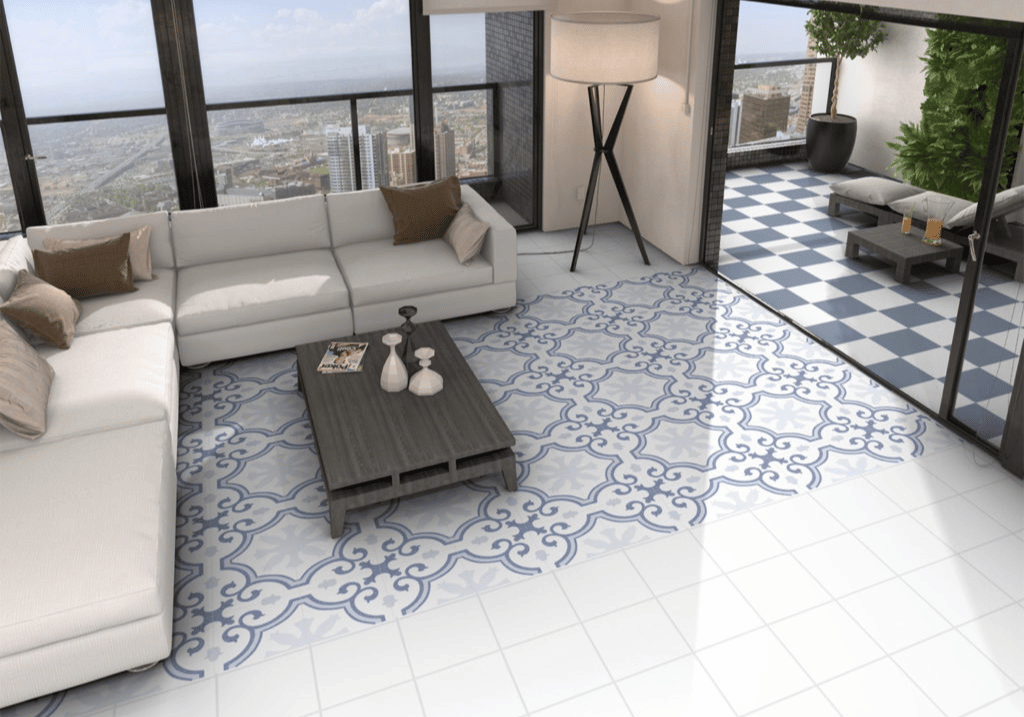
What are Porcelain Floor Tiles?
Well, all ceramic tiles are essentially porcelain, but the latter is more dense, less porous, and long-lasting.
This long-lasting quality is due to the special manufacturing method that uses a clay combination that is much more refined and fired at far higher temperatures than regular ceramic tiles.
Pressed under tremendous pressure, porcelain tiles are made from a mixture of fine clay, sand, and feldspar.
The tile is made even more water-resistant and its absorption rate is reduced to less than 0.5 percent thanks to this treatment, which also reinforces it.
This material is suitable for damper or wet areas, such as a kitchen or bathroom!
Hence their popularity.
The through-body composition of porcelain tiles is another distinguishing feature.
So, the design and colour doesn’t stop at the surface of the tile; they permeate its whole thickness.
This means they look great for longer, last through more wear and tear, and keep their colour even after being chipped — which happens very rarely considering how sturdy they are.
That means you don’t have to worry about the damage dropping items on it might do!
We delve more how tiles were made in this blog.
Why choose Porcelain Floor Tiles? The Benefits
When it comes to practical flooring solutions, tiles have been a go-to option for centuries – but porcelain floor tiles take that practicality to a whole new level.
Porcelain is a manmade type of ceramic, making it perfect for floor tiling due to its outstanding durability, strength and customisation options.
Below are some of the reasons why it’s so popular.
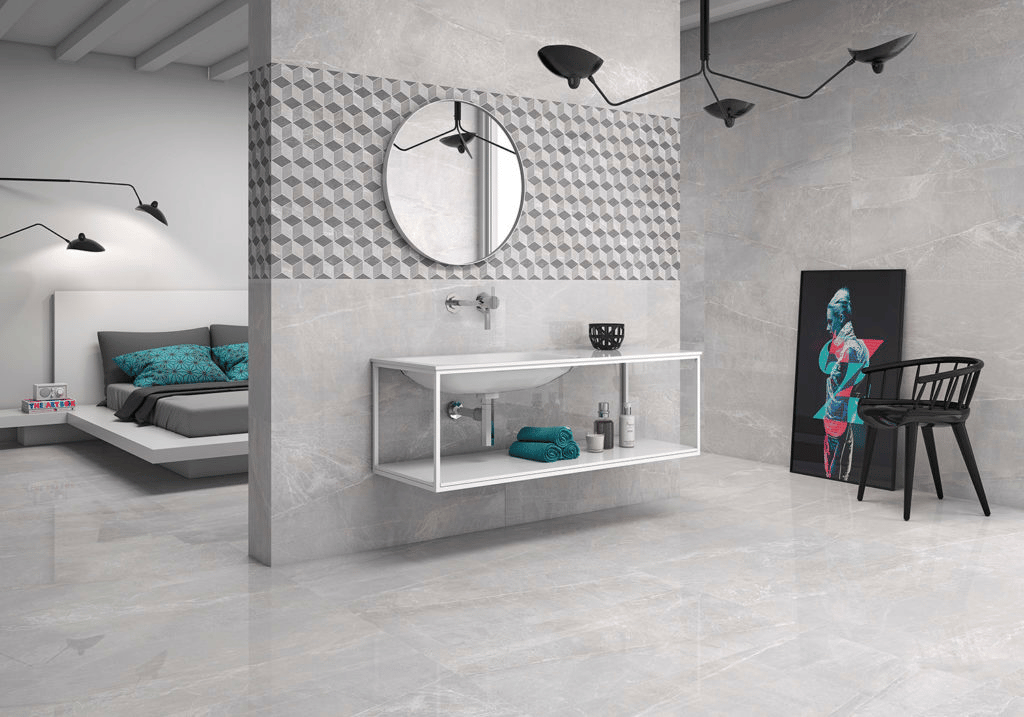
Strength and Durability
Hardier and stronger than other ceramics, porcelain floor tiles are made from clay that is finer and denser and subjected to higher temperatures and pressures during the manufacturing process, as outlined above.
Stain and Waterproof
Although porcelain floor tiles are versatile, they are especially well-suited for high-traffic areas of the house, such as kitchens and bathrooms, due to their exceptional resistance to water and stains.
Because of its high density, they are impervious to water and an excellent material for floors in bathrooms and other damp spaces.
In addition to being chemical and stain resistant, the material’s density makes it ideal for use as a kitchen floor covering.
They also carry great slip resistance in wet areas too.
Less Upkeep
If you put porcelain tiles in your home, you won’t not have to worry about them as much as other tiles.
Our non-slip floor tiles, along with our polished, gloss and satin options, are all remarkably low-maintenance; all it takes to keep them looking like new for a long time is a quick sweep and mop.
An odd time, you do end up with scuff marks.
However, we have a complete guide on how to get scuff marks out right here.
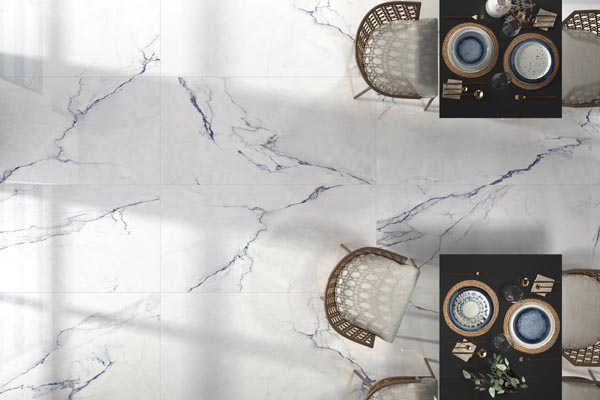
Endless Styles
The endless variety of styles and colours available for porcelain tiles makes them incredibly versatile as a flooring solution.
Even on a limited budget, porcelain tiles provide a world of design choices, from gorgeous rustic kitchens with low-maintenance wood-effect flooring to opulent living rooms with porcelain marble look floor tiles.
Lots of colours
Choosing the perfect hue or colour is essential because it greatly affects the aesthetic of your home renovations.
Fortunately, there is a plethora of colour options available to you to ensure that you achieve the perfect tone.
A light shade may be all that’s needed to get a crisp and tidy appearance.
But there is a wide variety of porcelain floor tiles available, including many different shades of white as well as creams, beiges, mild greys, and many more.
Irrespective of the shade you choose, they will all provide a breezy, airy sheen.
On the other hand, if you’re going for a more daring colour scheme for your interior design, porcelain floor tiles are a great way to inject some life into the room.
These can range from vivid oranges, reds, and yellows to delicate pastels like duck egg blue.
We guarantee that we have a tile that will complement your colour scheme.
Patterned porcelain floor tiles are a great way to give your floors personality.
There is a plethora of patterned choices available, including both elaborate multicoloured motifs and more understated monochromatic options.
Alternatively, if you prefer deeper tones, we have a wide variety of those as well.
From terracotta-hued porcelain floor tiles to dark grey stone-look tiles, from solid-colour to patterned black, and even some terrazzo, we’ve got it all.
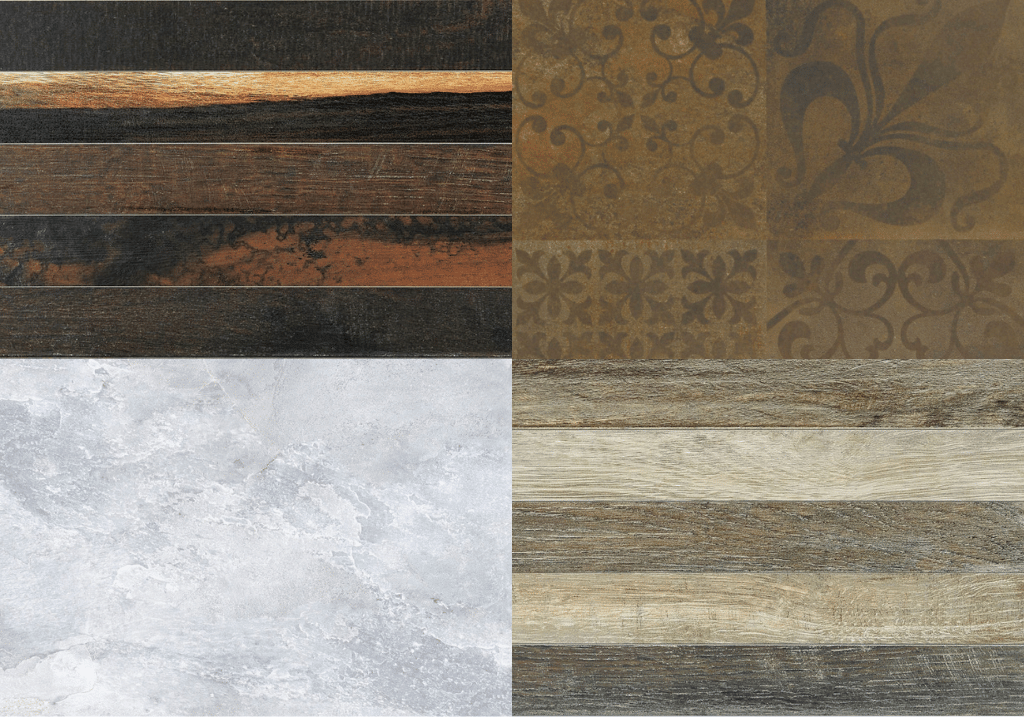
Finishes for Every Taste
Finally, don’t forget to factor in the finish on your porcelain floor tiles.
Within this extensive range you’ll find plenty of options for pulling off a variety of aesthetics.
Polished: Choose polished porcelain floor tiles if you’re looking for a high-quality finish.
Their beautiful sheen will reflect light and add a touch of elegance to any space, including bathrooms, kitchens, and more. A simple cleaning will be all that’s needed to keep them looking like new for years to come.
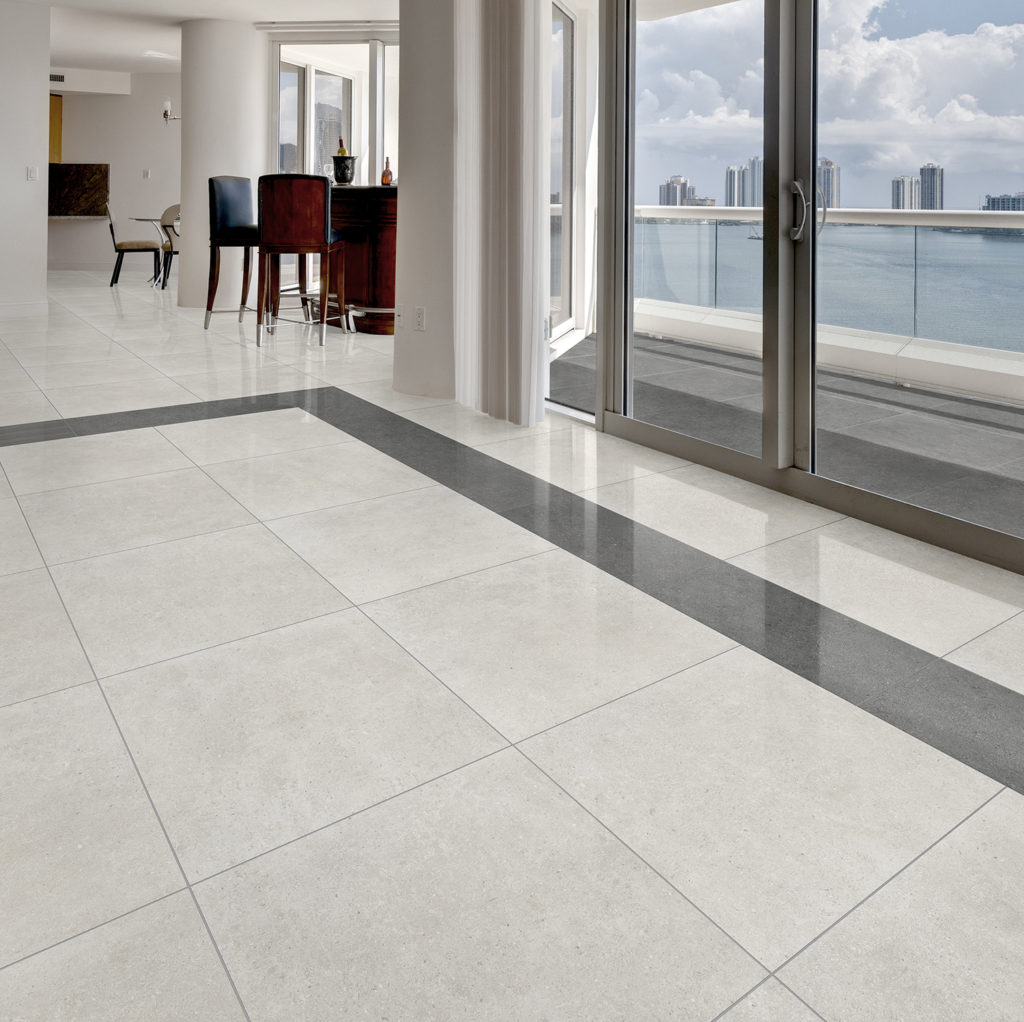
Matt/Satan: For a subtler aesthetic that works well with contemporary decor, consider our matt finish porcelain floor tiles.
Although their somewhat less reflective surface won’t illuminate the room to the same degree, the added texture and depth they provide more than make up for it. As an added bonus, matt glaze tiles are less likely to display water marks and streaks than shiny tiles, making them a low-maintenance option.

Textured/Stone Look: Our porcelain floor tiles come in a variety of textured surfaces, perfect for adding a little more visual interest and a satisfying feel underfoot. They may improve grip and add heaps of character to any space, whether they’re set in a stone-look or with beautiful mosaics.
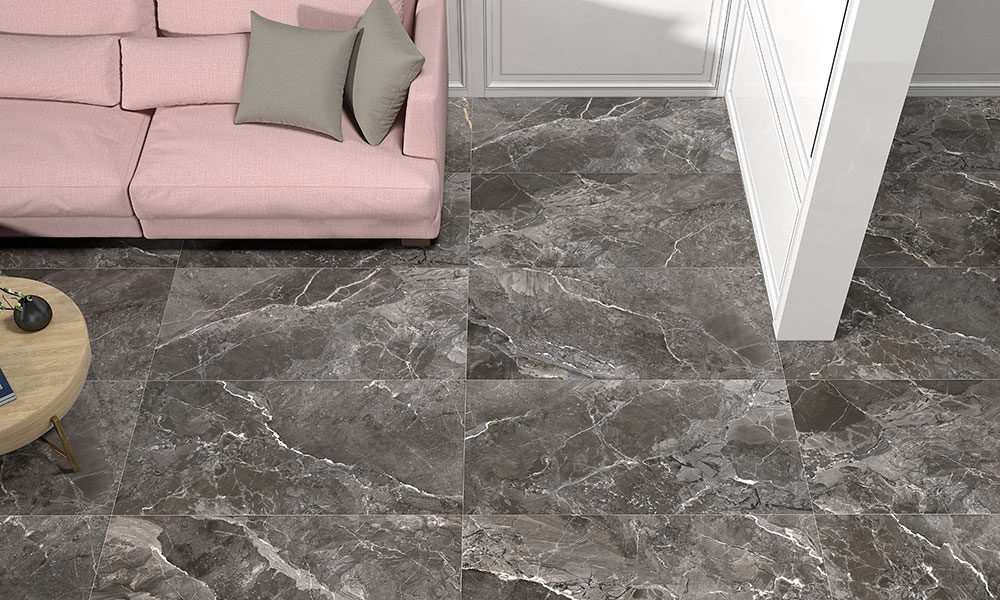
Non-slip:Selecting floor tiles having an anti-slip finish is an excellent method to fortify your property against needless falls. These tiles are ideal for usage in outdoor areas, kitchens, hallways, and bathrooms.
Before you buy, you should know if a porcelain tile is really slippery when wet.
Wood effect:Embrace the timeless charm of real wood flooring while taking advantage of contemporary wood effect tile technology. Hard porcelain wood appearance tiles are extremely durable, lasting a long time and protecting your flooring from wetness, scratches, and accidents.
There is a wide choice of realistic-looking finishes and tints to choose from, including mild wood-look floor tiles, designs with rich, dark hues, and many more.

Installing Porcelain Tiles Tips and Tricks
Even though some skilled individuals may be able to install porcelain tiles on their own, it’s always best to use a professional.
Porcelain tiles are more difficult to work with than other tile materials due to their weight and density. So you don’t want to run the risk of an expensive mistake!
Here is a rundown of the steps involved in the installation process:
Prepare the area!
Make Sure the Area Is Clear: Before installing tiles, make sure the area is free of any debris and dirt that might be on the surface as this can have a huge impact on the setting of the tiles.
The floors need to be levelled and any imperfections fixed as part of the surface preparation as well.
This is also a highly skilled job.
To avoid cracking, porcelain tiles should be placed on a level, smooth surface and handled with care.
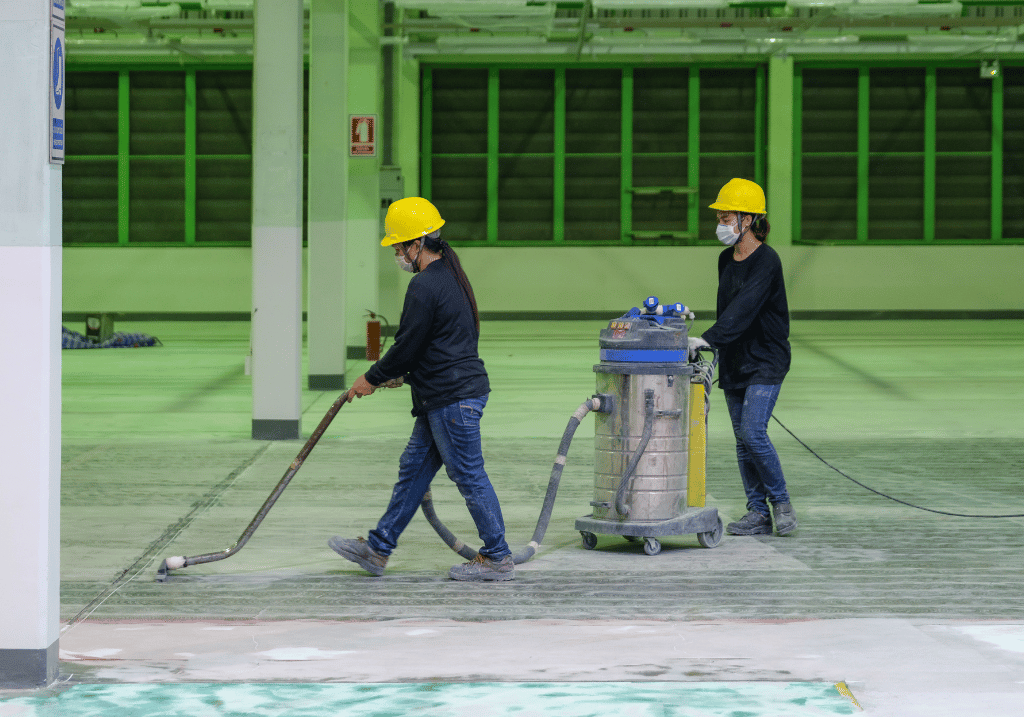
Correct Measurements
To minimise cuts and waste, prepare the layout by measuring the area.
Consider the layout of the room in relation to the tile pattern as well.
While it can also be a great idea to lay the tiles out on the floor before you use any adhesive.
Grouting the Floor
Get your equipment right first and foremost – that means specialist tools.
Because of the difficulty with cutting porcelain tiles, you will need a wet saw with a diamond blade.
You also want to be able to cut the tiles very precisely. A badly cut tile looks horrendous, especially around corners and fixtures.
The grout can get dirty over time, make sure you know how to clean it when it does.
Laying Porcelain Tiles
For porcelain tiles, use a premium and high-end adhesive.
Floors and walls require different adhesives also, so it’s important to choose the right one for each.
Ensuring you provide a nice equal coating of the adhesive to the wall or floor is critical. Apply it using a notched trowel at the consistent angle and depth to spread evenly.
When the time to lay the tiles comes around, press down (carefully) firmly on the adhesive to get a strong grip.
Alignment and uniformity of grout lines can be achieved with the use of spacers.
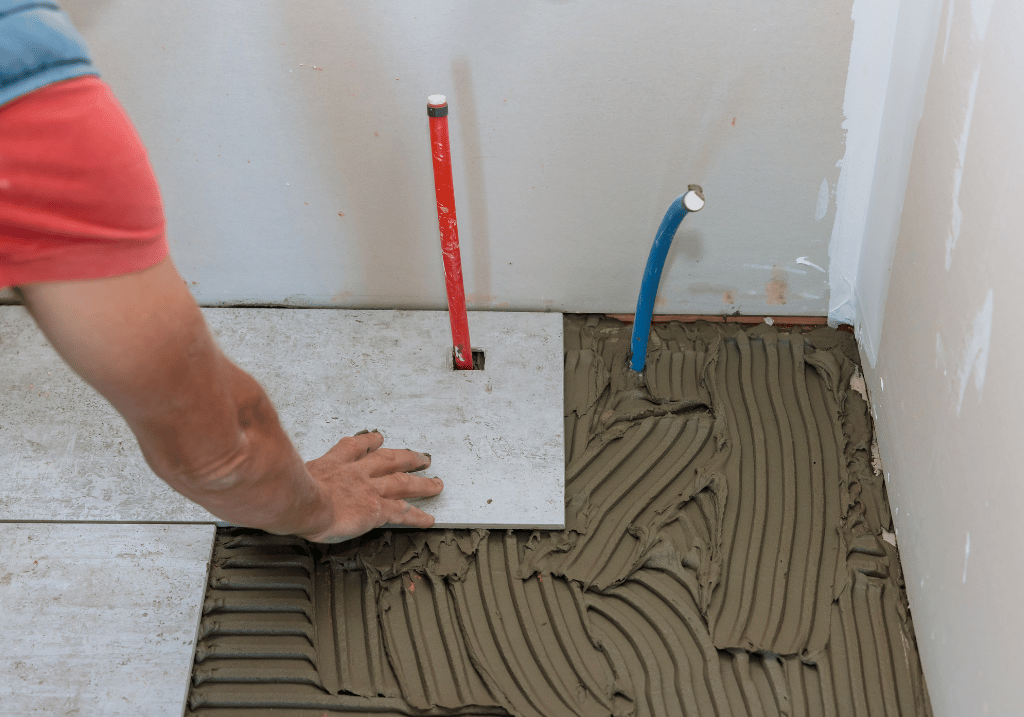
The Grout
Pick a grout colour that goes well with the tiles. It is best to choose a grout that can withstand water and stains when working with porcelain too.
It’s important that the adhesive must set before grout can be applied; after it’s set, use a moist sponge to remove any excess grout.
Protective Seal
Grout lines in particular should be sealed as it prevents any stains building up or water seeping in.
Curing Time
Please wait until the adhesive and grout have cured completely before making any use of the area.
The items utilised and the surrounding environment determine the variation in this time. DO NOT walk on these too early.
How to Maintain Your Porcelain Floor Tiles
Ok, now you’ve laid your beautiful new tiles. You want to keep them well, right?
Whether it’s in a commercial setting or in your home, you want to keep them shiny. Porcelain are long-lasting and are low maintenance , but that doesn’t mean you completely forget about keeping them looking their best.
Here are some helpful hints for taking good care of porcelain floors so they last a long time and look great:
Consistent Cleaning
The best way to keep your floor free of scratches caused by dirt and debris is to sweep or hoover it regularly.
For regular cleaning, wet a mop with warm water. A gentle floor cleanser or a solution of vinegar and water can accomplish a more comprehensive cleaning.
If you have unglazed porcelain tiles, you should clean up spills at once . To protect the tile surface from scratches, use a nonabrasive cleanser with a neutral pH.
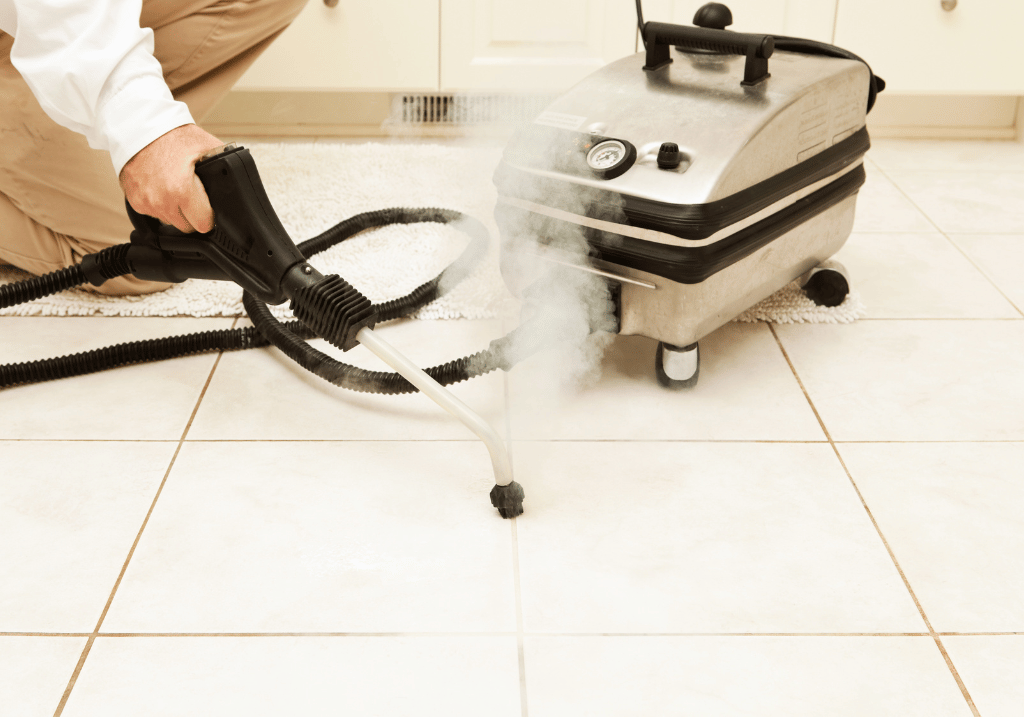
Steam Cleaning
A more thorough cleaning may be required from time to time, particularly in heavily used areas.
To clean porcelain tiles, follow the manufacturer’s instructions to ensure you don’t damage them with any heavy-duty cleaners or machines.
If you want your porcelain tiles spotless, but normal mopping just isn’t cutting it, try steam cleaning instead.
Eliminating Stains
Use Tile-Specific Cleaners: For very tough stains on porcelain tiles, use tile-specific cleaning solutions.
However, keep harsh and very potent chemicals away. Tiles can be damaged by the likes of abrasive cleaners, bleach or ammonia.
If you do get scuff marks, do not fear. This blog will tell you how to remove them.
Maintenance for Grout
Grout collects dirt and can dull the look of a floor if not cleaned regularly.
If you live in a particularly damp area, such as a kitchen or bathroom, you may want to think about sealing the grout to prevent water damage and stains.
So, consider using a bristle brush or a steam cleaner to get stains from the grout.
FAQs
Q: Do porcelain floor tiles have waterproof properties?
Porcelain tiles have excellent water resistance because of their low porosity. Although they are not completely waterproof, they are a great option for areas that are prone to moisture, such as bathrooms and kitchens.
Q: Is it possible to use porcelain tiles with underfloor heating?
Yes, porcelain tiles are indeed a great choice for use with underfloor heating systems due to their excellent heat conductivity. These products ensure that heat is distributed evenly and retained efficiently.
Q: What is the typical lifespan of porcelain tiles?
Porcelain tiles are renowned for their exceptional durability. When installed and maintained correctly, these flooring options have an impressive lifespan, often surpassing that of other types of flooring.
Q: How challenging is it to install porcelain tiles?
Installing porcelain tiles can be quite challenging compared to other types of tiles because of their density and weight. It is highly recommended to have a professional handle the installation for optimal precision and long-lasting results.
Q: Are porcelain tiles suitable for outdoor use?
Yes, porcelain tiles are a great choice for outdoor use, including patios and outdoor kitchens, thanks to their durability and resistance to moisture and frost.
Q: What is the best way to clean porcelain tiles?
Porcelain tiles are a breeze to clean using a mop and a gentle detergent. It’s important to steer clear of any harsh cleaners or scrubbers that could potentially damage the surface.
Q: Do porcelain tiles have the ability to replicate the appearance of natural materials?
Sure, no problem. With the advancements in manufacturing, porcelain tiles can now flawlessly replicate the look of wood, stone, and marble, providing a perfect blend of beauty and functionality.
Q: Can you explain the distinction between glazed and unglazed porcelain tiles?
Glazed porcelain tiles come with a coating on their surface, which provides a wider range of design choices and colour variations. Unglazed porcelain tiles possess a rich, organic aesthetic and offer excellent traction due to their slip-resistant nature.
Q: Are porcelain floor tiles in need of sealing?
Our Porcelain tiles do not need to be sealed because of their low porosity. It is important to seal the grout lines between the tiles to safeguard them against moisture and stains.
Why order with Ceramic City ?
At Ceramic City, we fully understand that choosing the right tiles for your home can be a challenge.
That’s why we strive to not only offer a vibrant and varied range of styles, colours and sizes, but also competitive prices on all of our products. From matt to polished porcelain tiles, patterned designs to plain, we’ve got it all right here at a price that suits everybody.
Our prices & Quality is what makes us one of the leading suppliers for porcelain floor tiles in Ireland. Not to mention the fact that, when you shop with us, a competitive price doesn’t have to mean sacrificing quality. All of our tiles are sourced from quality suppliers across Europe, ensuring you get a fantastic product for a fantastic price.
Struggling to decide which one of our gorgeous porcelain floor tiles to go for? Don’t worry, we fully appreciate that it can be hard to choose the right tile online. That’s why we offer tile samples instore.
If you don’t find what you’re looking for in our porcelain floor tiles range, or want to chat to a member of our first-class sales team about your options, don’t hesitate to contact us. Simply give us a call today on 094/9024250 or send us an email at info@ceramiccity.ie .
